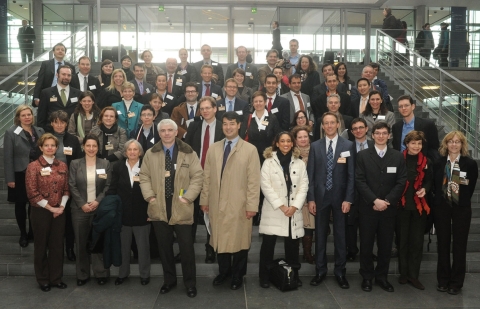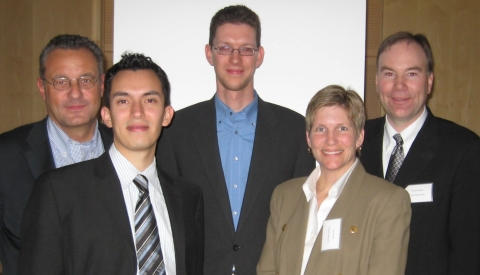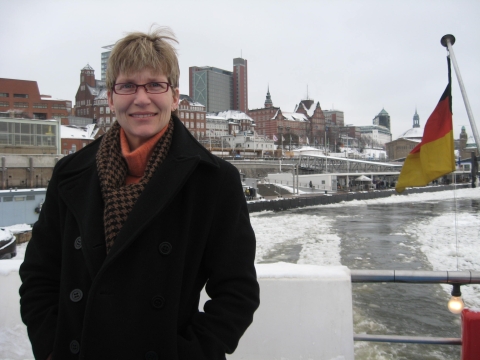
Participants of Round Table USA forum on climate change

Dr. Frank-Dieter Freiling with Burns alumni at Round Table USA forum

Nina Keck in Hamburg
You could call it a "post-Copenhagen" climate forum. In January, a month after the world climate summit in Denmark, a diverse group of nearly 50 journalists, experts and entrepreneurs traveled to Berlin, Hamburg and Copenhagen to discuss climate change, energy and their global economic impact. Most of us were alumni of transatlantic exchange programs like those sponsored by the Bosch Foundation, the Rias Berlin Commission, the German Marshall Fund and Fulbright Commission. Four of us were Burns alumni. We were brought together by the Round Table USA for a week of lectures, tours and discussions with local and national leaders from both the private and public sectors.
Many of the environmentalists and politicians we spoke to during the week were disappointed with what was not accomplished at the December summit in Copenhagen. But while the long sought after global approach to climate change is still evolving, our group saw firsthand some of the innovative steps that individual nations and local communities are taking to promote sustainability.
We started in Berlin where we spent time at the Bundestag with members of Germany’s Foreign Affairs Committee. We met with Burns alumnus, Dr. Robert von Rimscha, who was recently named Germany’s deputy head of policy planning for the Federal Foreign Office. Dr. Klaus Töpfer, Former Under Secretary General of the United Nations, talked about the evolution of the environmental movement in Germany.
A ninety-minute train ride took our group to Hamburg where our discussions, tours and workshops took on a more local bent. Hamburg, an industrial hub boasting Europe’s second largest port, was recently named the Greenest City in the European Union. City officials, environmental activists and local business leaders talked with us at length about what it took to win that distinction and what is still on the city’s agenda.
At our final stop in Copenhagen, we spent our days meeting with the head of the local Chamber of Commerce, the European Environment Agency, members of Greenpeace, and Anders Eldrup, CEO of DONG Energy, Denmark’s largest power producer. Eldrup explained how Denmark went from almost exclusive dependence on oil in the 1970s, to a renewable energy leader. He described his company’s large scale investments in off shore wind power, biomass and new ventures with electric cars. Our group toured one of DONG Energy’s biomass, wind and coal burning power plants for a firsthand look.
While I found the local experts informative and gracious, the added input from our group made this trip especially memorable. In addition to the many German and American journalists, there were environmental lawyers, energy policy analysts, engineers, professors, transportation and energy planners, international trade experts and entrepreneurs. Our group’s diversity, curiosity and expertise sparked some fascinating discussions, and gave the weeklong program a wonderfully nuanced depth.
My sincere thanks go the staff of the Körber Foundation (a member of the Round Table USA) which handled the logistics of the trip, and to the Burns Fellowship for inviting me to participate.
Nina Keck has worked for Vermont Public Radio since 1996. Previously she worked for the Voice of America and Wisconsin Public Radio. She has won two national Edward R. Murrow Awards for her reporting on VPR.
To read some of the stories that the Burns alumni produced after the trip, please click on the links below:
Nina Keck:
Activists Say Local Approach Needed For Climate Change
Tom Banse:
Part 1: Green Energy Fees Could Show Up On Electric Bills
Part 2: Learning From Germany's Clean Energy Investments
Charging Ahead: Electric Vehicle Rollout On Track